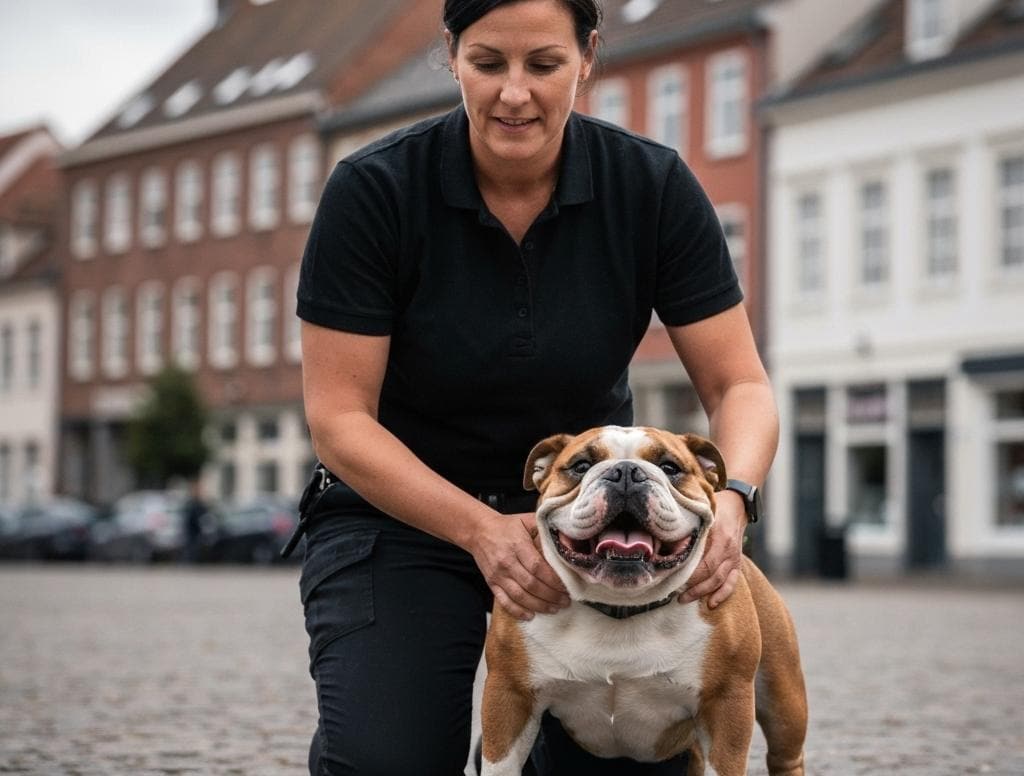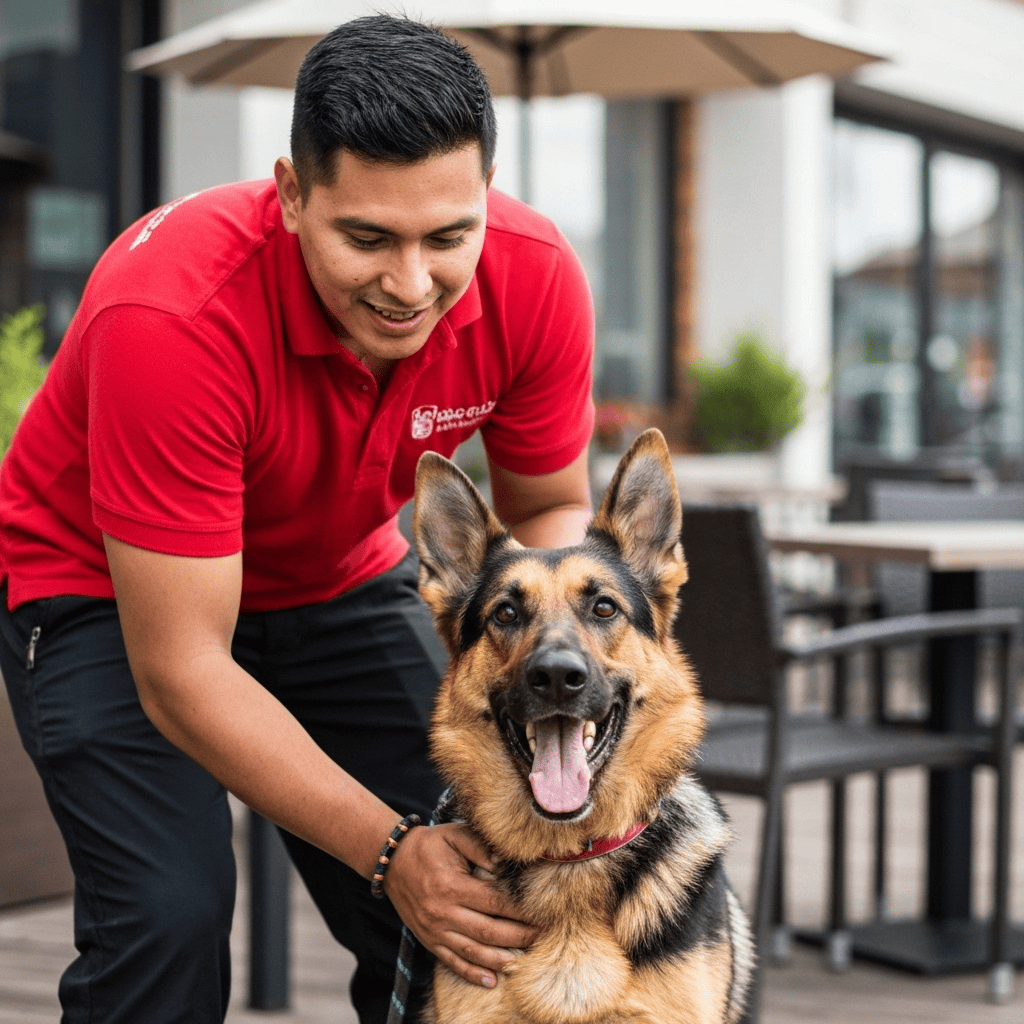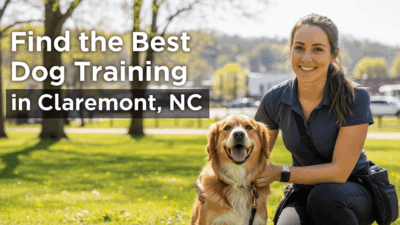Your Complete Guide to Choosing a Dog Trainer in Claremont
When you’re looking for dog training help in Claremont, you’re working with the advantage of small-town living. This quiet corner of Catawba County gives you peaceful neighborhoods for practicing leash skills, friendly local parks where dogs can learn to greet people politely, and easy access to bigger towns like Hickory when your dog needs more challenging distractions.
The key is finding training that actually fits your daily life here. Your dog needs to walk calmly down Claremont’s tree-lined streets, handle the occasional trip to busier areas, and maybe enjoy some off-leash time at nearby dog parks.
How to Choose the Right Trainer
The best trainers in this area focus on positive reinforcement, which means your dog learns through rewards rather than fear or punishment. This approach builds confidence and creates a dog who actually wants to work with you.
When you’re talking to potential trainers, ask about their education. Look for real credentials like CPDT-KA, KPA-CTP, or IAABC-CDBC. These aren’t just letters after their name – they show the trainer has studied dog behavior and keeps up with modern methods.
Most Claremont families do well with a mix of in-home training to work on daily routines and group classes to add distractions. If your dog has bigger challenges like reactivity toward other dogs or separation anxiety, you’ll want someone who can create a structured behavior modification plan and explain exactly how you’ll measure progress.
Common Dog Training Methods Explained

Positive reinforcement is straightforward – when your dog does something you like, good things happen. Food, praise, toys, or even just getting to sniff that interesting spot on your walk can all be rewards.
This method works especially well for puppy training and basic skills like loose leash walking around Claremont’s neighborhoods. Your dog learns that walking nicely beside you is the fastest way to get where they want to go.
Classical conditioning is about changing how your dog feels about things that worry them. If your dog gets tense around other dogs or startles at loud trucks, this approach helps them develop more positive associations over time.
Puppy socialization deserves special attention because it’s so time-sensitive. The goal isn’t to overwhelm your puppy with experiences, but to carefully introduce them to the sights, sounds, and situations they’ll encounter as an adult dog. Short trips to places like the entrance of local hardware stores or quiet observation time near parks can build confidence.
Private lessons let you work on your specific challenges in your actual environment. Board and train programs can jump-start your dog’s skills, but remember that you’ll still need coaching to maintain those results once your dog comes home.
If you’re interested in service dog training or therapy dog work, understand that these have specific legal definitions and training requirements. Most local trainers can help with foundation skills, but ask for clear information about what they can and cannot provide.
Average Cost of Dog Training in Claremont (Updated for 2025)
Training costs in Catawba County are generally more reasonable than what you’d find in Charlotte or other major cities. Most trainers charge modest travel fees for in-home visits if you’re outside Claremont proper.
| Service Type | Typical Price (Catawba County) | What You Get |
|---|---|---|
| Group classes, 4–6 weeks | $150–$275 total | Small groups, basic obedience or puppy classes |
| Private lessons, 60–75 min | $90–$150 per session | Custom coaching at home or a park |
| Day training, per week | $450–$800 | Trainer works your dog, then owner handoff |
| Board and train, 2–3 weeks | $1,800–$3,200 | Daily pro training with follow-up lessons |
| Behavior consult, initial | $125–$200 | Assessment, management plan, next steps |
| Puppy starter package, 4–5 lessons | $325–$600 | House rules, potty training, socialization |
Most trainers offer package deals that bring down the per-session cost. Specialized behavior cases or travel to more distant parts of the county might increase these prices.
Questions to Ask a Potential Dog Trainer
- What methods do you use, and how do you keep training stress-free for dogs and people?
- What certifications do you hold, and how do you stay current with new research?
- What does your training program include, and how will you adapt it to my specific goals?
- How will you teach me to maintain progress between our sessions?
- Do you offer in-home training, group classes, or board and train, and which would work best for my situation?
- What are the total costs, including any travel fees or cancellation policies?
- Do you carry liability insurance, and can you provide proof if needed?
- If we’re dealing with reactivity or fearfulness, do you work with veterinarians when appropriate?
Local Laws, Safety, and Practical Tips
Claremont follows Catawba County’s animal control ordinances, which require dogs to be restrained when they’re off your property. This makes leash training more than just good manners – it’s following local law.
Your dog needs current rabies vaccination under North Carolina state law, and you should keep the rabies tag on their collar for identification. Catawba County doesn’t currently require a separate dog license program, but vaccination records are essential.
You can get detailed information about local animal services and requirements through Catawba County Animal Services. For statewide rabies information, check NC DHHS Rabies guidelines.
If your trainer wants to use public parks or other venues for classes, they should get permission first. Most parks departments are happy to work with responsible trainers, but it’s better to ask than assume.
Local Claremont Resources for Dog Owners
Dog Parks for Off-Leash Practice:
- Conover Dog Park in nearby Conover offers separate areas for small and large dogs, perfect for working on recall and social skills
- Stanford Park Dog Park in Hickory is popular and well-maintained, giving you a chance to practice calm greetings with lots of different dogs
- Maiden Dog Park provides a smaller, community-focused space that’s less overwhelming for nervous dogs
Trails and Parks for Leashed Training:
- Riverbend Park offers beautiful trails along the Catawba River where leashed dogs are welcome – check current rules at Riverbend Park
- Mountain Creek Park in Sherrills Ford has multi-use trails perfect for distraction training – see details at Mountain Creek Park
Other Helpful Resources:
- Humane Society of Catawba County provides low-cost microchipping and vaccination clinics at HSCC
- Catawba County Animal Services handles lost and found reports, bite incidents, and questions about local ordinances at Animal Services
Insurance and Trainer Requirements in North Carolina
North Carolina doesn’t require dog trainers to have special licenses, but that doesn’t mean all trainers are equal. Responsible professional trainers carry general liability insurance to protect themselves and their clients.
If a trainer works with employees, they typically need workers’ compensation coverage. Those who transport dogs might carry commercial auto insurance as well.
When trainers want to use county parks for group classes, they should check whether they need permits or special permission. Most parks departments are cooperative, but they want to know about commercial activities on their property.

Common Questions
How much does in-home dog training cost?
Private lessons in the Claremont area typically run $90 to $150 per session. Most trainers offer package deals that bring the per-visit cost down if you book multiple sessions.
Is in-home dog training worth it?
Absolutely, especially for issues like leash pulling, door manners, or house training. When your trainer works in your actual environment, your dog learns the rules that matter most to your daily routine, and you see faster, more lasting results.
Can you pay someone to house train your dog?
A trainer can absolutely help set up systems and routines for potty training, but your success will depend on consistent follow-through every day. The trainer teaches you both, but you’re the one who maintains the schedule.
What is the 3-3-3 rule for dog training?
This rule suggests that new dogs need about 3 days to decompress from a big change, 3 weeks to start settling into routines, and 3 months to feel truly at home. It’s a helpful guideline for setting realistic expectations, not a rigid timeline.
How long will it take to reach my training goals?
Basic obedience and leash training often show good progress within 4 to 8 weeks if you practice consistently. Behavior issues like reactivity or fearfulness typically take longer and need more structured plans with gradual progress.
What should I bring to group classes?
Pack a flat collar or harness, a 6-foot leash, water for both of you, and plenty of small, soft treats. Some facilities require proof of vaccinations, so ask when you register.
What’s the leash law in Claremont?
Dogs must be restrained when they’re off your property. Public spaces require leashes unless you’re inside a designated off-leash dog park. Contact Catawba County Animal Services for specific questions.
Do I need a dog license in Claremont or Catawba County?
There’s no general dog licensing program, but your dog must have current rabies vaccination and wear the rabies tag for identification. Your veterinarian provides this when they give the vaccine.
What shots does my dog need in Catawba County?
Rabies vaccination is required by state law. Your vet may recommend other vaccines like distemper-parvo or bordetella based on your dog’s lifestyle and risk factors. Check NC DHHS Rabies guidelines for official requirements.
Are dog trainers required to be licensed in North Carolina?
No special license is required, which makes it more important to look for trainers with respected credentials. Consider certifications like KPA-CTP, CPDT-KA, or IAABC-CDBC, and always ask about insurance.
Where can I practice off-leash recall?
Use fenced dog parks like Conover Dog Park, Stanford Park Dog Park, or Maiden Dog Park. County parks and greenways require leashes, but you can practice recall there using a long training line for safety.
Which dog parks allow training around Claremont?
Conover Dog Park, Stanford Park Dog Park in Hickory, and Maiden Dog Park are your closest options. Keep any training sessions short and considerate of other users, and avoid blocking entrances or crowding other dogs.
What trails allow dogs for training?
Catawba County parks like Riverbend Park and Mountain Creek Park welcome leashed dogs on most trails, making them perfect for distraction training. Always check posted rules at park entrances for current policies.
What credentials should I look for?
Look for independent certifications that demonstrate real knowledge and ongoing education. You can learn about different credentials at dog trainer certifications, including specialized options like CBCC-KA for behavior work.
Do trainers need insurance to teach in parks?
While it’s not legally required by the state, most property owners and parks departments require proof of liability coverage before allowing business activities. Responsible trainers carry this insurance and get proper permission before using public spaces.
Finding the right training approach for your dog in Claremont doesn’t have to be complicated. With patient, positive methods and regular practice in your actual neighborhood, most dogs can learn to handle daily life here beautifully. The key is finding a trainer who understands both dogs and the practical realities of life in small-town North Carolina.
